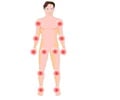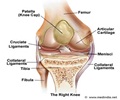An ancient remedy of using frozen peas to bring relief to sore joints and bruises has formed the backbone of a recent medical product called frozenpeaz, which can provide the same relief to pain.

Traditional ice packs which employ plastic bags that contain silicone gel - and cold compresses help in cutting inflammation by constricting blood vessels and can help bring about pain relief.
Frozen peas are convenient as they need not thaw like ice packs. Researchers have come out with the perfect bag of peas which can also be refrozen, without it losing its shape.
The corn syrup 'peas' are available in bags which can be placed in wraps shaped for knees, shoulders and faces and cost between NZ$37 and $92. The recommended time for a session of cold therapy is twenty minutes.
"Ice packs and hot and cold treatments are a proven way of easing the pain of arthritis in the short term, and some might find this product useful," says Jane Tadman of Arthritis Research UK. "But they are much more expensive than a pack of peas."
 MEDINDIA
MEDINDIA



 Email
Email








